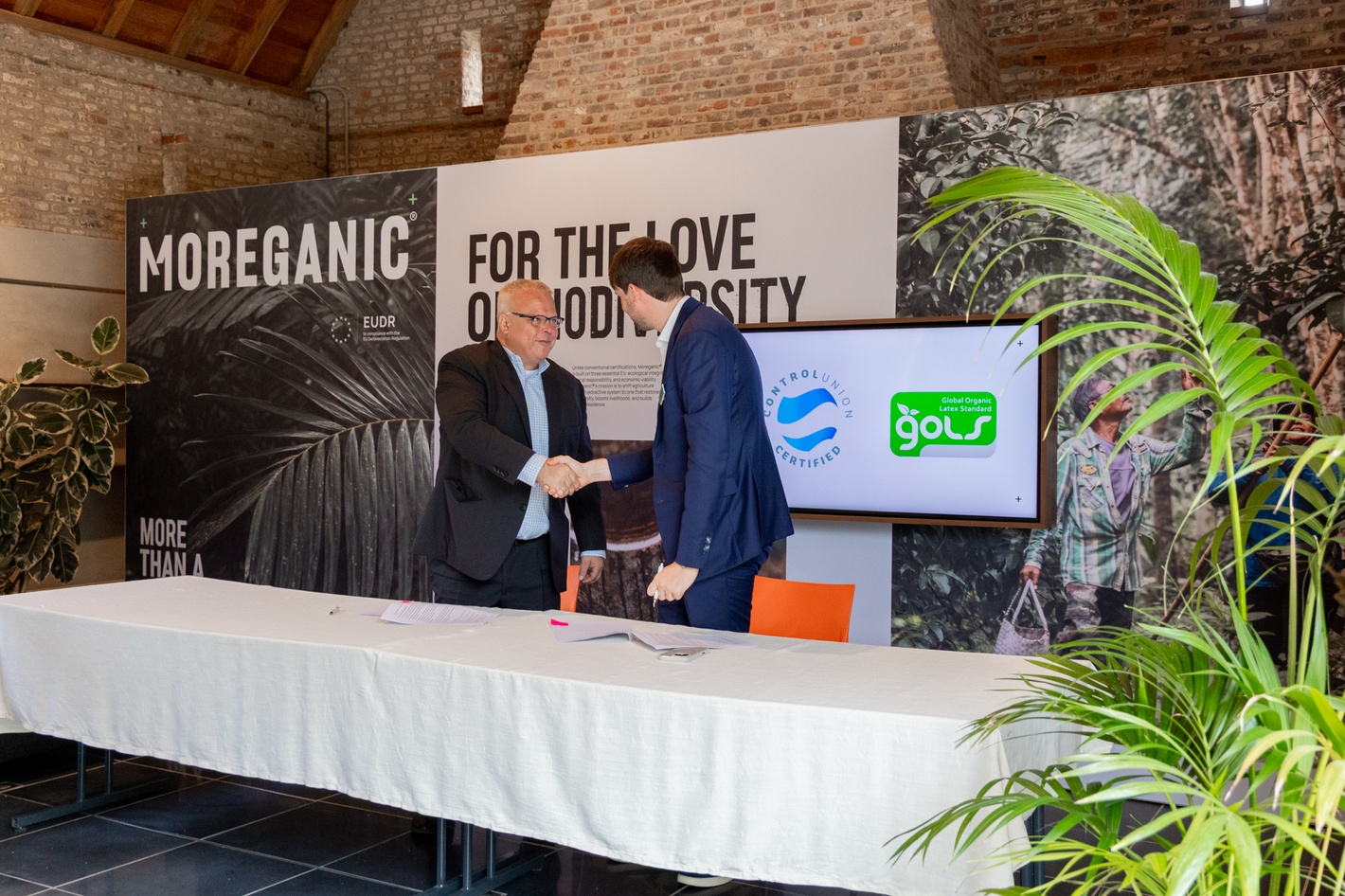
GOLS Transition
On August 22, 2025, Control Union and Moreganic signed a Memorandum of Understanding (MoU) to support a structured transition of the Global Organic Latex Standard (GOLS) chain-of-custody into the Moreganic® Rubber Farm Management Standard. This evolution expands certification scope to include biodiversity impact, fair labor safeguards, farmer premiums, and enhanced traceability.
From GOLS to Moreganic
On this page you can find information on what this means for certified stakeholders, supply chain partners, brands, and retailers.
-
What is the nature of this agreement?
Control Union and Moreganic have agreed on a structured transition from GOLS certification to the Moreganic program. Control Union has been instrumental in both creating and maintaining GOLS, and importantly, in helping shape and develop the Moreganic standards themselves - making them the ideal partner to bridge certificate holders from GOLS into Moreganic.
This partnership reflects Moreganic's mission to fundamentally change how natural latex is sourced - moving beyond organic-only frameworks to address the complete reality of latex production: biodiversity restoration at farm level, inclusive and fair economics for smallholder communities, and transparent traceability throughout the supply chain.
GOLS successfully established global recognition for organic latex. Moreganic builds on that foundation with a more comprehensive approach designed to drive measurable environmental and social impact:- Mandatory biodiversity targets
- Verified premium flows to farmers and supply chain stakeholders
- Social, ethical and environmental dimensions
- Alignment with evolving regulatory and marketplace requirements
- Complete chain-of-custody from identified farms through retail
Control Union's deep expertise in latex certification, from building GOLS to co-developing Moreganic, positions them uniquely to support GOLS certificate holders through this onboarding process, ensuring operational continuity while transitioning to an enhanced, future-looking standard.
This represents an intentional evolution in how the industry approaches sustainability, with Moreganic positioned to drive the transformation of. -
Why is this transition taking place now?
Several market forces are driving this evolution:- Farmer economics - Premium pricing and diversified income opportunities through biodiversity and crops improve farm revenue and income stability.
- Market demand - Buyers increasingly require measurable impact beyond "organic" certification, which remains a certification most appropriate for food produce.
- Regulatory alignment- New requirements like the EU Deforestation Regulation (EUDR) demand enhanced supply chain transparency.
- Industry consolidation - The transition streamlines a fragmented certification landscape for latex products.
- Climate resilience - Biodiversity and agroforestry practices help create resilient microclimates and improve soil health.
- Standards maturity - Moreganic standards benefited from Control Union's extensive experience, including with GOLS across diverse geographies and operation types. This collaborative development process ensured the framework addresses real-world certification challenges while raising the bar on impact requirements.
GOLS has successfully created global awareness and market recognition for organic latex. Moreganic builds on this foundation, expanding scope to meet today's sustainability expectations and regulatory environments. Latex spans agriculture and manufacturing. The farm is biological and the foam is engineered. Moreganic focuses where it can move the industry to do better - with limited chemicals, biodiversity on farms, improved soil health, fair value to smallholders, and traceability of the latex component.
Upcoming changes
This section answers key questions about upcoming requirements, documentation, and costs, as well as what farmer groups, processors, and brands can expect. You’ll also find details on how impartiality will be safeguarded throughout the transition.
-
What enhanced benefits does Moreganic bring compared to GOLS?
As a Farm Management Standard, Moreganic seeks forward-impact through a number of dimensions:- Biodiversity criteria of 10%+ of farm area dedicated to agroforestry or natural vegetation, promoting multi-cropping and companion planting.
- Economic premiums with direct farmer premiums above local market prices with transparent payment structures.
- Fair labour safeguards and ethical responsibility requirements, including no forced labour, worker safety training, and grievance mechanisms.
- Additional revenue stream opportunities from secondary crops, beekeeping, and biodiversity practices.
- Enhanced traceability and comprehensive chain-of-custody systems.
- Designed to build trust and impact while allowing higher smallholder participation.
- Moreganic Field & Certification Support (MFCS) team providing ongoing guidance, training, and biodiversity action plan development.
- Alignment with evolving regulatory requirements (EUDR) and impact-focused customer expectations.
- Backed by regional development partnerships, such as with the Rubber Authority of Thailand (RAOT).
- As a Chain-of-Custody, Moreganic seeks to bring product integrity in a verifiable and relevant way, while observing a pragmatic market approach.
-
What are the specific new requirements I'll need to meet?
Transition paths:Organic-certified farms to → Moreganic Farm Management Standard
- Farms certified as organic can transition into the Moreganic Farm Management Standard; requirements by observing and verifying biodiversity, social and ethical components.
GOLS CoC to → Moreganic CoC
- Supply-chain operators certified under GOLS CoC can transition into the Moreganic CoC module. However, as a sustainability certification, Moreganic does not permit organic status claims on the final product, in the markets that still allow such claims.
Core requirements for farmers and other supply participants
- Equivalency and gap assessment – review your existing farm management system and identify gaps with Moreganic.
- Enable traceability at product and farmer premium payment level.
- Biodiversity Action Plan (MBAP) – Develop a 5-year plan for biodiversity enhancement.
- Labor protections – Mandatory worker-grievance mechanism and fair-labor documentation.
- Documentation & records – Maintain land-use maps, input logs, labour records, and training documentation; retain for 5 years.
- Worker safety – Where chemicals are used, provide appropriate PPE and safety training.
-
As a farm operation, what documentation will I need to maintain?
- Land Use Documentation - Maps showing certified/non-certified zones, chemical storage areas, buffer zones
- Biodiversity Documentation – Moreganic Biodiversity Action Plan progress, species lists, buffer zone maps, monitoring updates
- Traceability Records – Premium payment flows, volume reconciliation logs, sales records.
- Input Use Logs - Fertilizer and chemical records by field and date
- Labor Records - Worker contracts, training attendance, hours worked, grievance logs
All records must be kept for 5 years or since initial certification, whichever is shorter
Moreganic provides standardized templates and guidance for all required documentation
-
Who do I contact if I have questions?
For questions on certification & audits and transition changes, please contact your Control Union audit lead as usual for current certificates.For questions on the Moreganic program details, please contact Moreganic at GOLS.transition@moreganic.com
-
Will this change increase my costs?
The aim is to keep auditing costs in line with market realities. Moreganic certification fees support farmers, research, and digital supply chain traceability while providing labeling rights and marketing support. As a sustainability certification focusing on biodiversity impact, a key difference from GOLS is the accessibility of Moreganic, which does not require supplementary organic certification and programs. This translated into more local impact and lower onboarding costs.Excluding premium payment to farmer groups, the fee structure for manufacturers and retail participants ranges from 0.25% to 1%, determined by certified material sales.
Value Proposition
- Premium payments to farmers above official published prices
- Additional local revenue opportunities from biodiversity practices (secondary crops, beekeeping)
- Enhanced market access and buyer trust
- Technical support through Moreganic team
- Digital traceability tools
- Enhanced retail marketing support

Governance & Independence
This section addresses questions about Moreganic's relationship with Novaya, data protection policies, and the governance structures that ensure long-term impartiality and credibility throughout the certification process.
-
Was is the relationship between Moreganic and Novaya?
Moreganic originated within Novaya as a living program over two years ago, building on development efforts by the Latexco team and contributing to the Artilat-Latexco merger. Critically, both its Farm Management and Chain-of-Custody standards development involved collaboration with Control Union, leveraging their expertise from years of GOLS implementation to ensure certification rigor and market credibility. The program began as an active certification system in Thailand, delivering measurable benefits to farmers and communities with established flows and chain-of-custody processes.As Moreganic has matured and proven its impact, it transitioned to become a standalone, independent entity with its own governance structure. While Novaya helped develop and implement the initial program, Moreganic now operates as a separate organisation where Novaya participates as one of several stakeholders, subject to the same standards and fees as all others. The Board is being formed and will include independent members, and an Advisory Council with farmers, auditors, and retailers ensures ongoing impartiality.
-
How is sensitive business data protected?
Certification fees are collected based on certified flows, but all data and invoices are verified and safeguarded by the scheme's auditing body. Competitor information is never shared with/between other participants. Moreganic only receives aggregated reports on adoption, not company-specific details. -
How will impartiality be maintained long-term?
Moreganic's development process itself demonstrates commitment to independence: Control Union, as an accredited third-party certification body with decades of standards development expertise, helped co-develop the Moreganic standards. This collaborative process ensured the framework was built on proven certification principles rather than single-entity interests.Moreganic is formalising a governance charter with clear data firewalls, conflict-of-interest policies, and transparent reporting, consistent with best practices in global certification systems. To ensure neutrality, the governance structure will also provide fair representation of the entire supply chain, such as farmers, processors, manufacturers, retailers and independent experts.
-
Will the Moreganic Farm Management Standard cover other materials beyond latex?
Yes. While natural latex is the starting point, the vision for Moreganic includes broader agroforestry and biodiversity-based products (e.g., cup lump, honey, coffee, cacao, timber). The focus remains on impact at the farm level and transparency through the chain of custody. -
What are the next steps in the transition?
The parties are currently working on finalising the Moreganic Farm Management Standard and related scheme materials. Stakeholder consultations with farmer groups, processors, brands, and retailers will be scheduled throughout this process. Updates will be provided regularly by both Moreganic and Control Union. -
How can I participate in shaping the transition?
We welcome input from all stakeholders. Please register your interest by writing to GOLS.transition@moreganic.com to be included in the consultation process.
Closing statement
The evolution from GOLS to Moreganic reflects the natural maturation of sustainability certification as it moves away from backward-looking audit exercises to forward-looking, action-driven systems that reward those implementing measurable change at the source while delivering clear benefits for farmers, the environment, and supply chain partners.
Moreganic focuses on this next phase by serving buyers who have moved beyond organic label requirements to demand measurable biodiversity outcomes, verified farmer premiums, and manufacturing transparency.